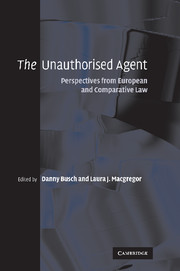Book contents
- Frontmatter
- Contents
- List of contributors
- Foreword
- Preface
- Abbreviations
- Table of cases
- 1 Introduction
- PART 1 The civilian legal systems
- PART 2 The common law
- PART 3 Mixed legal systems
- PART 4 International ‘codes’
- PART 5 Conclusions
- 13 Comparative law evaluation
- 14 Comparative conclusions
- Bibliography
- Index
13 - Comparative law evaluation
Published online by Cambridge University Press: 07 September 2009
- Frontmatter
- Contents
- List of contributors
- Foreword
- Preface
- Abbreviations
- Table of cases
- 1 Introduction
- PART 1 The civilian legal systems
- PART 2 The common law
- PART 3 Mixed legal systems
- PART 4 International ‘codes’
- PART 5 Conclusions
- 13 Comparative law evaluation
- 14 Comparative conclusions
- Bibliography
- Index
Summary
Introduction
In this chapter we come to the heart of the matter, namely identifying common approaches, or the ‘common core’ of the rules on unauthorised agency. In addition, as set out in the introductory chapter, we highlight the areas where the common core is deficient. To the extent that the common core is lacking, we suggest which approach is preferable.
In part II we devote some attention to the nature and general effect of unauthorised agency. Afterwards, we turn to the main exceptions to the general effect of unauthorised agency: apparent authority (III) and ratification (IV). In part V a treatment of the liability of the falsus procurator is provided. Part VI contains a treatment of the interrelationship between apparent authority, ratification and the liability of the falsus procurator. Parts VII and VIII each elaborate on special cases which can be associated with unauthorised agency, namely, acting in the name of a principal yet to be named and acting in the name of a company yet to be incorporated.
Unauthorised agency
In the legal systems studied, unauthorised agency arises in a wide variety of cases. It arises when the agent concludes a contract in the name of the principal, but has no authority at all, when he exceeds his authority or when the agent's authority has ended at the time of the conclusion of the contract.
- Type
- Chapter
- Information
- The Unauthorised AgentPerspectives from European and Comparative Law, pp. 385 - 438Publisher: Cambridge University PressPrint publication year: 2009



